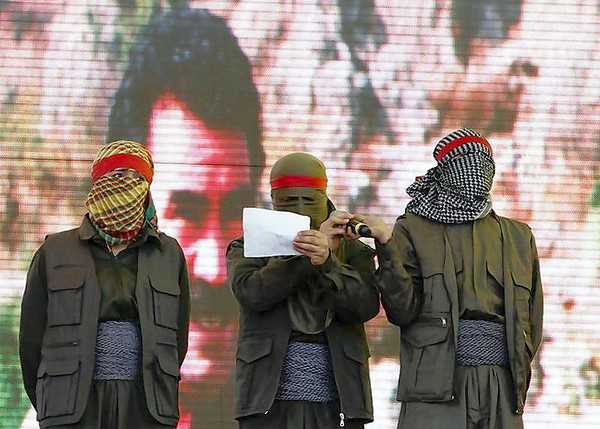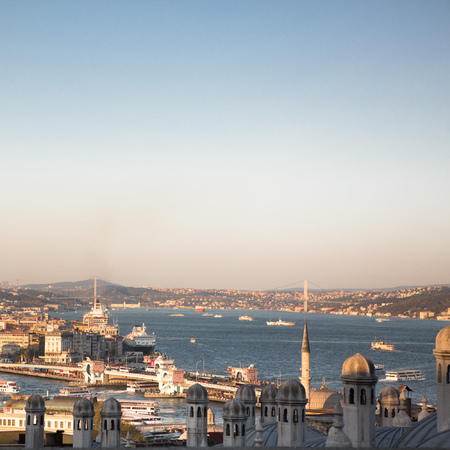
The main nationalist party, however, was quick to reiterate its opposition to any dealings with the militants.
Rebel field commander Murat Karayilan on Thursday ordered his fighters to begin leaving Turkey on May 8 for the mountains of northern Iraq, in a step to halt a war that has killed more than 40,000 and scarred the nation.
The pullout is a major step forward in a peace plan hammered out during months of negotiations between Turkey’s MIT intelligence agency and the Kurdistan Workers Party (PKK) chief Abdullah Ocalan, jailed on a prison island near Istanbul.
The onus is now on the government to enact reforms sought by Ocalan and his followers, a process that will require support for changes to the constitution in the face of nationalist anger at negotiations with a man they have long reviled.
“The point we have reached in the process is very important and we need to be sensitive for it to be completed successfully,” Deputy Prime Minister Bulent Arinc said.
“It is necessary to determinedly avoid behavior and actions which would sabotage the process,” he said, criticizing opposition parties including the Nationalist Movement Party (MHP) for seeking to “besmirch” the government.
Nationalists have made no secret of their opposition to negotiating with the Kurdish militants.
“The Turkish nation will under no conditions surrender to the PKK or consent to the PKK’s treacherous demands,” MHP leader Devlet Bahceli said in a statement.
The withdrawal announcement has given a boost to Prime Minister Tayyip Erdogan, who has taken a huge political risk in sanctioning negotiations with the PKK ahead of local and presidential elections next year.
Pushing through constitutional reform, which could also pave the way for Erdogan to take the helm of new presidential system next year, will be fiercely resisted in parliament by nationalist politicians.
Erdogan will need to manage public opinion carefully as the elections approach. But for now the mainstream media is backing a process which proponents say could lift the economy, boost Turkey’s international credibility and cement Erdogan’s legacy.
“His courage ended terrorism,” the front-page headline in the mainstream Haberturk newspaper said of Erdogan. “Game Over”, said the Yeni Safak daily, which is close to the government. “Go and don’t come back”, Posta newspaper said of the militants.
DISARMAMENT
Ocalan, who began peace talks with Turkish intelligence agents from prison six months ago, brought the violence to a halt with a ceasefire order at Kurdish new year celebrations on March 21.
From May, some 2,000 rebels are to move into Iraq in small groups, monitored on the Turkish side by the MIT and by the Kurdish regional government in Iraq.
Speaking in the PKK’s stronghold in the Qandil mountains of northern Iraq where thousands of its members are based, Karayilan indicated that Erdogan’s demand that the fighters disarm before they leave Turkey had been quietly dropped.
Dressed in baggy olive green fatigues and flanked by other senior rebels, Karayilan said Ankara would first have to push through reforms guaranteeing Kurdish rights and release Ocalan before the PKK would consider disarmament.
Arinc brushed aside the apparent discrepancy over when disarmament would take place with little explanation:
“There is no confusion. If it is said armed elements will leave, there is no need to ask whether they are armed or not.”
Since coming to power in 2002, Erdogan has extended rights to Kurds who make up 20 percent of Turkey’s 76 million-strong population, breaking taboos deeply rooted in the conservative establishment, including allowing Kurdish television broadcasts and elective Kurdish language courses at state schools.
But the government faces deeper demands including changes to the constitutional definition of citizenship and strengthening regional government in the mainly Kurdish southeast.
Thousands of Kurdish politicians and activists have also been detained in recent years over alleged links to the PKK, designated a terrorist group by Turkey, the United States and European Union, and Ocalan is expecting their release.
Around 200 PKK-linked defendants have been released from custody pending trial in the last two months, the Zaman daily said on Friday, suggesting some progress on that front.
(Editing by Nick Tattersall)

